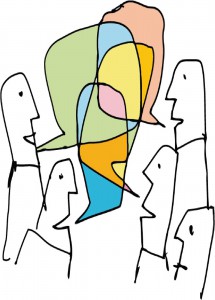Listening tips for better relationships 
How many of you took Listening 101 in high school or college? None of you? Me either. And yet, isn’t that one of the most important skills we can acquire? Ernest Hemmingway said I have learned a great deal from listening carefully. Most people never listen. It’s not that people don’t want to listen, they often don’t understand its importance.
When you really listen to another person from their point of view, and reflect back to them that understanding, it’s like giving them emotional oxygen. Stephen Covey puts the importance of listening to others in a nutshell. We all crave to be listened to, to be understood. It’s a deep seated human need. Learning to listen to others with empathy can dramatically change your personal and professional relationships. Here are 3 listening tips to help you listen better.
Tip #1 is to prioritize listening!
This is simple on the surface but not so simple in practice. Another Stephen Covey quote sums this up well:Most people do not listen with the intent to understand; they listen with the intent to reply. We are, by nature, selfish creatures, which serves us well in certain situations. However, when it comes to listening, that selfishness blocks us from truly listening to the other person.
So, our basic human nature gives us a self-oriented filter when we listen. We are busy considering our point of view. We are wondering how our experience relates to theirs. Or we’re contemplating our opinion on the topic they are discussing. It takes our INTENTION AND ATTENTION to stay focused on what they are saying and what it means to them. We need to put our egos aside and concentrate on the other person.
So, the first tip is to realize that listening takes our energy. We have to turn our attention and intention to the other person we are talking to. Proactive listening requires an awareness of our tendency to listen with the intent to reply and a commitment to put the other person first.
Curb your impulse to interrupt. If it’s important, you’ll remember it. And if you don’t, putting the other person is still more important from their perspective! As a habitual blurter, I can honestly say that making a concerted effort to curtail that habit has really increased my listening skills.
Tip #2 is to practice listening twice as much as we speak.
We have two ears and one mouth – perhaps there is a reason for that! Using this as a general rule of thumb is a great way to calculate whether we dominate the conversation or whether we allow the other person to get their oxygen. It’s a handy trick to help you when you start paying more attention to your listening to check your ego and really let the other person express themselves.
Tip #3 is to pay attention to what the other person really needs from the conversation.
Sometimes we really just need to be listened to. Many of us have an understandable impulse to try to fix people’s problems. There are certainly times when our advice is wanted and even needed. There are other times when the other person just wants to vent. Paying close attention, or even asking them if you’re in doubt, will let you know if they are looking to let off some steam or if they are looking for helpful input.
This has been particularly hard for me! I am a helper by nature so my inclination is to give what I think are helpful suggestions. I have learned that watching their reaction to the first one or two ideas that I throw out there is a very indication of whether I should come up with other ideas or just nod my head sympathetically!
I hope these listening tips have been helpful. As a coach and consultant, I am always here to listen to you. Contact me for a free consultation today!

